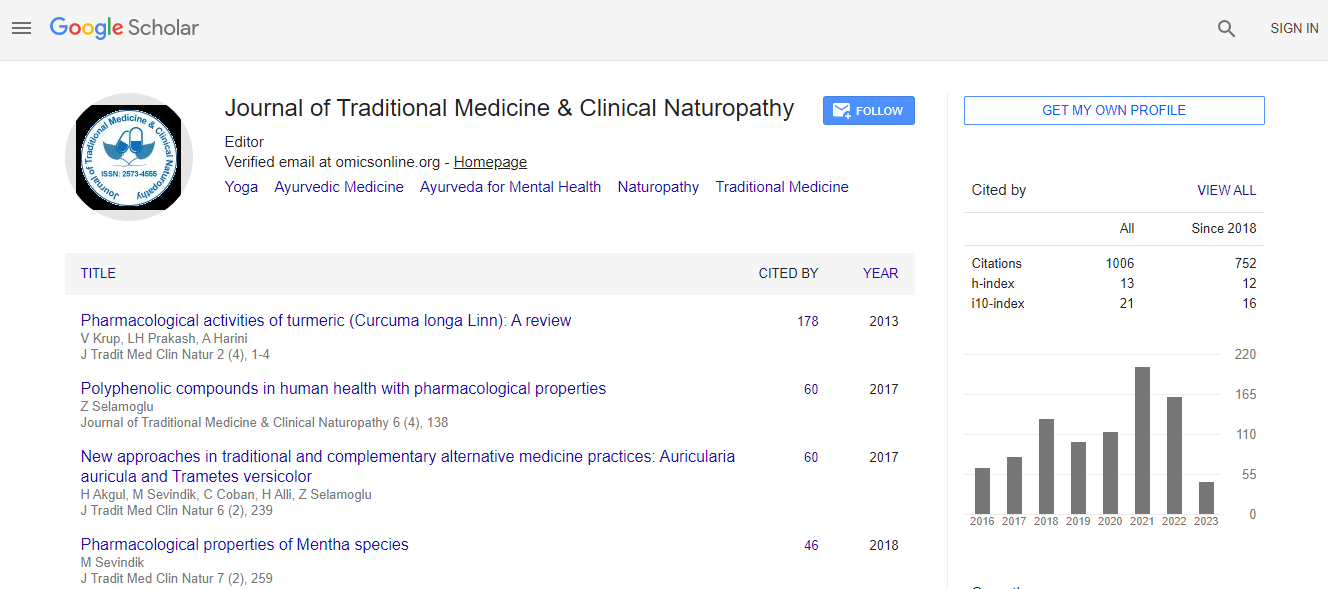Our Group organises 3000+ Global Conferenceseries Events every year across USA, Europe & Asia with support from 1000 more scientific Societies and Publishes 700+ Open Access Journals which contains over 50000 eminent personalities, reputed scientists as editorial board members.
Open Access Journals gaining more Readers and Citations
700 Journals and 15,000,000 Readers Each Journal is getting 25,000+ Readers
Google Scholar citation report
Citations : 1504
Journal of Traditional Medicine & Clinical Naturopathy peer review process verified at publons
Indexed In
- CAS Source Index (CASSI)
- Google Scholar
- Sherpa Romeo
- Open J Gate
- Genamics JournalSeek
- RefSeek
- Directory of Research Journal Indexing (DRJI)
- Hamdard University
- EBSCO A-Z
- Publons
- Geneva Foundation for Medical Education and Research
- Euro Pub
- ICMJE
Useful Links
Recommended Journals
Related Subjects
Share This Page
Cultural Myths, Superstitions, and Stigma Surrounding Dementia in a UK Bangladeshi Community
12th International Conference on Traditional & Alternative Medicine
Nazmul Hussain
University of Southampton, UK
Posters & Accepted Abstracts: J Tradit Med Clin Natur
Abstract
Statement of the Problem: The last three Census data highlighted that UK Bangladeshi communities have the worst health outcomes. This includes a higher risk of type two diabetes and heart diseases; both are risk factors for developing vascular dementia. However, little is known about Bangladeshi community members' understandings of dementia, including cultural myths. This paper focuses on the cultural myths, superstitions, and stigma surrounding dementia in an English Bangladeshi community from the direct experiences of people living with dementia, their caregivers, and the views of dementia service providers/stakeholders. Methodology & Theoretical Orientation: This qualitative research was undertaken with three distinct participant groups using semi-structured interviews (n=25), who were recruited from community settings. The first and second participant groups explored the experiences of people with dementia (n=10) and their family caregivers (n=10). The third group examined stakeholders' / service providers' views (n=5). Interviews were recorded digitally and transcribed verbatim. Findings were reached using an interpretive approach, emphasizing the sense people make in their own lives and experiences and how they frame and understand dementia. Findings: The study revealed that participants with dementia and their caregivers have 'alternative' knowledge about dementia and do not necessarily understand dementia in a Westernized scientific/bio-medical context. Misconceptions about dementia and belief in various myths and superstitions can lead people to go to spiritual healers or practice traditional remedies rather than to their GPs, delaying their dementia diagnosis. Conclusion & Significance: This paper concludes that there is a lack of awareness among the Bangladeshi participants and a need for targeted awareness about dementia to help dispel cultural myths and combat the stigma surrounding dementia within the Bangladeshi community. This paper concludes with policy and practice recommendations to improve the support available to people living with dementia and their careers in the Bangladeshi community that could be applicable to other minority communities..Biography
Dr Md Nazmul Hussain is a Research Fellow at School of Health Sciences, University of Southampton, B67, SO17 1BJ, Southampton, UK.

 Spanish
Spanish  Chinese
Chinese  Russian
Russian  German
German  French
French  Japanese
Japanese  Portuguese
Portuguese  Hindi
Hindi 
